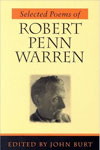Notes:
Poetry is best when taken in doses of 2—read twice, preferably aloud, and then discussed with a friend.
Here are quotes by Flannery O’Connor (packed with a mouthful of “meaning”) that point to the heart of what we’re after when engaging a poem or a work of art.
Meaning is what keeps the short story from being short…not abstract meaning but experienced meaning, and the purpose of making statements about the meaning of a story is only to help you to experience that meaning more fully.
The type of mind that can understand good fiction is not necessarily the educated mind, but it is at all times the kind of mind that is willing to have its sense of mystery deepened by contact with reality, and its sense of reality deepened by contact with mystery.
~ Flannery O’Connor
_______________________________________________________________________________
This month’s selections are from Robert Penn Warren and Lucinda Williams. They keep with the spirit and questions of Easter and early spring. What are the pathways of life? How is accepting a “mortal limit” a “swing” to “restore” things like “The breath of earth? Of rock? Of rot? ...of whatever dream we clutch?”
The narrator of the sonnet, Mortal Limit, begins with seeing a “hawk ride updraft in the sunset over Wyoming.” The narrator of the somber and meditative Broken Butterflies speaks directly to someone, a “you.” The “you” is apparently trapped in a self-destructive and habitual disposition of anger, with all its illusions of strength and perceptive clarity.
In an unflinching and graphic manner the narrator describes the condition but suspends any “judgment.”* Instead, the narrator suggest a pathway out, a difficult path, but a path nonetheless…
Enjoy!
Mortal Limit
I saw the hawk ride updraft in the sunset over Wyoming.
It rose from coniferous darkness, past gray jags
Of mercilessness, past whiteness, into the gloaming
Of dream-spectral light above the last purity of snow-snags.
There—west—were the Tetons. Snow-peaks would soon be
In dark profile to break constellations. Beyond what height
Hangs now the black speck? Beyond what range will gold eyes see
New ranges rise to mark a last scrawl of light?
Or, having tasted that atmosphere's thinness, does it
Hang motionless in dying vision before
It knows it will accept the mortal limit,
And swing into the great circular downwardness that will restore
The breath of earth? Of rock? Of rot? Of other such
Items, and the darkness of whatever dream we clutch?
Broken Butterflies
by Lucinda Williams
You wear your anger well and stand
For all the world to see
A heavy cloak and one gloved hand
And no humility
You stand inside the garden
And feast on black cherries
And swallow the manna from Heaven
And spit out the seeds
You spread your anger on sharp-edged knives
Cut my skin and make it bleed
Like Pilate in his self righteousness
You're a traitor and a thief
And choking on your unplanned words
Coughing up your lies
Tumbling from your mouth
A flurry of broken butterflies
Broken butterflies
They rest their wings snapped in two
On their way to certain death
Their colors gold an' blue
But the blood that flows I cannot hide
The blood that covers me
Nourishes the butterflies
And they are healed and are set free
I wish you had what Ruth possessed
But then I don't expect that of you
Grace and honor and faithfulness
And the love that you refuse
Will you ever learn to just forgive?
Will you open your beautiful eyes?
And bleed the way Christ did
And fix the broken butterflies
____________________________________


Footnote:
*It is interesting to think about this “suspension of judgment.” It hearkens to an ancient Greek term and idea termed epoche. Here it is displayed in mature form, especially with respect to moral judgment. It is a “maturity” that requires experience and a tuning of the heart (love and emotions) with the perceptive powers of the mind (including the imagination). The narrator of Broken Butterflies perceives the hold of habitual destructive anger and its dynamic links to false perception and to false speech. The narrator displays deep moral perception and discernment but no “judgment”—no sense of a damning categorization, no sense of judging from a superior moral condition. There is compassion, insight, and hope. The tension of the “suspended judgment” doesn’t swing to a sentimental gush of emotion for the angry person, and blur perception of what is truly eating at his insides as well as blur the pathway out. Nor does the tension swing to a position of moral superiority and judgment which also blurs perception of the person and the pathway out. (As we know, this mature form of judgment is echoed—and demanded—in the New Testament.)
© 2015 Samuel & Erasmus institute. All Rights Reserved • 22903 Emily Trace Lane, Katy, Texas 77494
SEi is a Federal 501 (c) (3) tax exempt public charity. Contributions are tax deductible.









